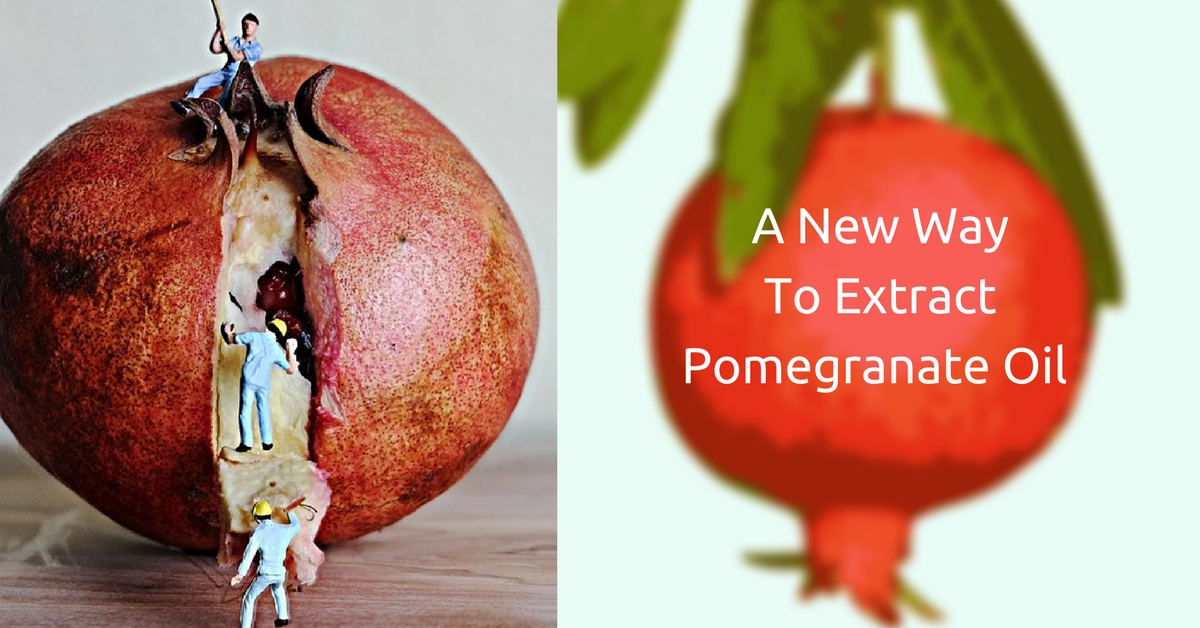IIT Bombay Finds Easy Way To Extract Super-Healthy Oil From Pomegranates!
There have been other methods of extraction but there have always been shortcomings. This new method will extract the oil more efficiently with little to no shortcomings.

Pomegranates are an intriguing fruit. As old as the ancient Vedas, pomegranates have not only been consumed for their delectable taste, but also for their medicinal properties against various ailments.
The seeds of pomegranates contain unique properties, and once the oil is extracted, it takes on antioxidant, anti-diabetic to even anti-cancer properties.
The problem though lies in how the oil is extracted. Until now, the cold press method, which has an average extraction efficiency of 4.29% in weight of oil has been most common. However, it is believed to degrade the proteins in the oil
There have been other methods of extraction that involve high temperatures, using mechanical pressure and superheated hexane, but these have shortcomings too. They produce by-products that are environmentally harmful.
Discovering newer methods is crucial if we are to extract the oil within the fruit. And that’s what Prof. Amit Arora and his team from the Indian Institute of Technology IIT Bombay have discovered in a new study–-a new cost-effective, zero-waste method of extracting oil from pomegranate seeds, which also yields high-quality protein and dietary fibres.
The proposed one-pot oil-extraction method is also environment-friendly. The method is fairly simple and can also be used for small quantities of seeds, say the researchers.

In the proposed method, pomegranate seeds are dried, powdered and added to sodium phosphate and incubated for ten minutes at 45ºC. Then, to break down the covering of the seeds, the enzyme protease is mixed, which releases the oil.
The seed-enzyme mixture is shaken continuously for four to 16 hours and then centrifuged for 20 minutes. After this, clear layers of pure oil, proteins and fibres are formed, which can then be extracted.
Talking to Research Matters, Prof. Amit Arora from IIT Bombay commented on how the oil fares against other well-known oils, “Considering the quality of oil and protein in pomegranate seeds, it can very well replace flax seeds. It is very similar to chia seeds in properties. It can be considered a replacement for many functional properties.”
According to World Pomegranate Market Supply, Demand And Forecast, India has been the world’s largest pomegranate producer and one of the largest exporters of fresh and processed pomegranates since 2013.
This means that the business of pomegranates still has a lot of unexplored potential. With this process of extraction, pomegranate oil could very well be one of India’s major export of a healthy product.
Hey, You May Also Like: Want to Become a Scientist for Climate Change? Here’s How You Can Help Researchers
Like this story? Or have something to share?
Write to us: [email protected]
Connect with us on Facebook and Twitter.
NEW: Click here to get positive news on WhatsApp!

Similar Story

Laundromats in India? Couple Built Rs 100 Crore Biz Washing Dirty Linen Across 100 Cities
Faridabad’s Arunabh Sinha and his wife Gunjan Taneja launched UClean in 2017 to set up an organised laundromat service in India. Currently, they are spread across 100+ cities and have 350+ outlets across the country.
Read more >
If you found our stories insightful, informative, or even just enjoyable, we invite you to consider making a voluntary payment to support the work we do at The Better India. Your contribution helps us continue producing quality content that educates, inspires, and drives positive change.
Choose one of the payment options below for your contribution-
By paying for the stories you value, you directly contribute to sustaining our efforts focused on making a difference in the world. Together, let's ensure that impactful stories continue to be told and shared, enriching lives and communities alike.
Thank you for your support. Here are some frequently asked questions you might find helpful to know why you are contributing?


This story made me
-
97
-
121
-
89
-
167












